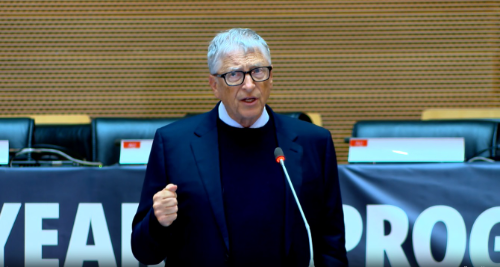Bill Gates Pledges Bulk of $200B Fund to Africa Over Next 20 Years

TLDR
- Bill Gates announced that the Gates Foundation will direct most of its $200 billion endowment to Africa over the next two decades
- The announcement was made in Addis Ababa, where Gates addressed African leaders, calling for stronger collaboration on health and development
- Gates urged African governments to prioritize primary healthcare and education as key drivers of long-term prosperity
Bill Gates announced that the Gates Foundation will direct most of its $200 billion endowment to Africa over the next two decades. The announcement was made in Addis Ababa, where Gates addressed African leaders, calling for stronger collaboration on health and development.
The pledge comes as the foundation prepares to wind down by 2045. Gates urged African governments to prioritize primary healthcare and education as key drivers of long-term prosperity. “Helping mothers before and during pregnancy, and supporting nutrition in a child’s early years, delivers the strongest results,” he said.
The foundation has invested in over 100 health innovations, claiming to have saved more than 80 million lives. Gates highlighted partnerships with Ethiopia, Nigeria, Rwanda, Zambia, and Zimbabwe as examples of innovation-led progress.
Gates’ remarks come amid sharp cuts to U.S. foreign aid programs, including PEPFAR. Studies warn these cuts could lead to millions of preventable deaths. The Gates Foundation says it will continue to support vaccines, maternal health, and poverty reduction efforts.
Despite criticism over philanthrocapitalism and reliance on foreign donors, Gates reiterated that private wealth should serve the public good. He also plans to meet African heads of state to discuss AI and healthcare.
Daba is Africa's leading investment platform for private and public markets. Download here
Key Takeaways
Gates’ $200 billion Africa pledge arrives at a time when official development aid, particularly from the U.S., is being scaled back. Cuts to programs like PEPFAR, previously credited with saving millions of lives, leave a gap that private philanthropy is stepping in to fill. The Lancet projects that cuts alone could cause up to 500,000 child deaths by 2030. The Gates Foundation’s expanded footprint—now with offices in Ethiopia, Kenya, Nigeria, Senegal, and South Africa—signals a shift in the center of gravity for global health funding. But this growing reliance on billionaire-led philanthropy raises concerns. Critics argue that private donors, though well-funded, are not democratically accountable and may push agendas aligned with corporate interests, such as genetic engineering in agriculture. Experts caution that while such funds provide short-term relief, long-term health resilience requires government-led, locally controlled systems. As aid flows decline and philanthropy grows, African nations face a pivotal choice: how to balance foreign funding with homegrown solutions that ensure sustainability beyond donor cycles.

Next Frontier
Stay up to date on major news and events in African markets. Delivered weekly.
Pulse54
UDeep-dives into what’s old and new in Africa’s investment landscape. Delivered twice monthly.
Events
Sign up to stay informed about our regular webinars, product launches, and exhibitions.




